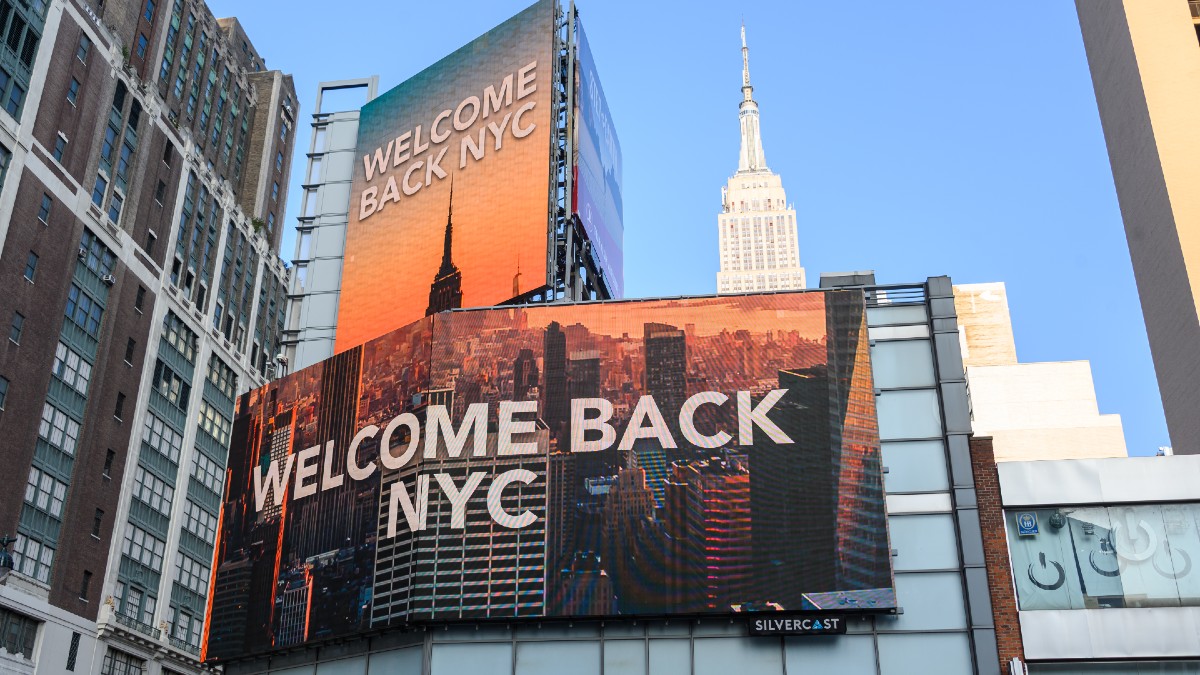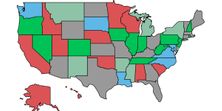New York Legislature Advances Mobile Sports Betting Framework
Noam Galai/Getty Images.
The New York State Senate and Assembly advanced a multi-operator mobile sports betting framework within their budget bills Monday, a key move toward legal statewide mobile wagering and the competitive market model favored by most gaming stakeholders.
The Senate advanced its budget proposal 43-20. The Assembly followed seconds later with a 106-43 vote. Democrats, which have supermajority control in both chambers, largely championed the bill over Republican objection during several hours of debate in each chamber ahead of Monday's vote.
The critical step forward comes after mobile sports betting legislation lingered in both chambers for months. Industry observers believe lawmakers’ competitive online sports wagering model could generate several hundred million dollars in annual tax revenues, a minor part of the legislature’s $200 billion budget projection, but nevertheless a major contention point in the state’s spending deliberations.
That’s because the multi-operator provision runs against the single or limited operator model Gov. Andrew Cuomo favors. The competitive market framework’s budget inclusion underscores lawmakers’ confidence they can overcome Cuomo’s opposition.
Both chambers must now reconcile key differences in a joint conference committee before mobile wagering (and the overarching spending legislation) can pass into law ahead of the legally-mandated April 1 deadline. Few lawmakers addressed sports betting (or gaming in general) during lengthy debate ahead of Monday's vote aside from a few concerns over video lottery terminal funding allocation at a few pari-mutuel horse racing tracks.
Lawmakers must also earn approval from Cuomo, the embattled chief executive who nevertheless maintains significant tangible and intangible influence over the budget.
Still, Monday’s mobile sports betting budget inclusion is the most promising sign yet that multi-operator mobile sports betting could come to what could be the nation’s highest-grossing sports betting market.
New York Online Sports Betting Legislation Details
Cuomo’s limited-operator model and lawmakers’ competitive market remain the pivotal divide preventing mobile legalization; legislators are largely unified behind tax rates, license allocation and other key details that have stalled or killed similar proposals in other states.
Both the Assembly and Senate bills would allow two online licenses, or “skins,” to each of the four commercial casinos as well as the state’s three Native American gaming tribes. This would create as many as 14 possible skins, roughly the same as neighboring Pennsylvania but fewer than New Jersey, the nation’s largest market by handle.
BetRivers, DraftKings, FanDuel and Bet365 all have retail commercial casino sportsbook deals that would translate to online options under the bill. Caesars / William Hill, Stars Group / FOX Bet and Kambi have tribal partnerships.
Penn National’s Barstool Sportsbook already has a deal for BetRivers’ second skin should this bill pass. Golden Nugget has a second-skin agreement with FanDuel’s commercial casino partner, Tioga Downs.
Other top sportsbook operators such as MGM would also be in the mix for an online license. MGM purchased Yonkers Raceway partially to gain a retail foothold for a potential BetMGM sportsbook or online casino.
Online sportsbooks would be taxed at 12% gross gaming revenue, slightly above the 10% national median average. The rate won’t likely deter operator interest in what would be the most populated (and lucrative) state to legalize mobile wagering.
The $12 million initial licensing fee would be among the nation’s highest but still seems unlikely to deter market participation. New Jersey, with less than half New York’s population, now averages nearly $1 billion in monthly handle, an estimated 20% of which comes from New Yorkers.
Retail sportsbooks would be taxed at 8% GGR. The bill authorizes retail betting at certain off-track betting facilities as well as large professional sports stadiums such as Madison Square Garden and Yankee Stadium.
There are myriad differences between the two chambers’ initial proposals relating to gaming, such as allocating three downstate retail casino licenses, and a host of other provisions including recreational marijuana legalization. Still, Assemblymembers and Senators are largely aligned on key mobile sports betting details, a necessity as they go against Cuomo’s vastly different proposal.
Lawmakers’ Plan Runs Into the Governor’s
Cuomo’s administration has remained mostly quiet about its sports betting plans since the governor upended the sports betting world in a whirlwind 24 hours earlier this year by first announcing mobile wagering support, then pivoting to a lottery-run, sole-source model. Ensuing press releases expanded this to “operator or operators” but the notoriously stubborn governor has given little indication he has backed down from his initial plan.
This continues to stall mobile wagering. Though Cuomo has been hit politically by his handling of COVID-19-related nursing home deaths as well as sexual harassment allegations, he remains the most influential elected official in New York politics. Now in his third gubernatorial term, Cuomo has held a grip over fellow Democrats in the legislature, which combined with his powers as chief executive, have helped him dictate the state’s spending and policy decisions.
That grip may be weakening. A growing number of state and federal-level New York politicians have called for Cuomo’s resignation. The multi-operator sports betting provisions in the upcoming fiscal year budget is the latest indicator yet rank-and-file legislators are willing to confront the governor’s policies.
Next Steps
January’s State of the State address that outlined Cuomo’s sports betting plans came before his multi-front misconduct investigations. It was also before Congress passed its latest massive COVID-19 relief bill, which should allocate enough funds to bridge most if not all of New York’s projected $15 billion budget shortfall.
Gubernatorial investigations and the new federal cash flow recalibrate the deliberations around previously high-profile decisions such as sports betting, marijuana legalization and tax increase. These issues remain, but it could upend the previous political calculus just weeks before the budget deadline.
The already frenetic budgeting process reaches its zenith in the coming weeks as policymakers scramble to reach consensus between lawmakers and the governor. The two legislative chambers’ budget bills are opening salvos directed at the governor’s priorities.
That outcome remains to be seen, but lawmakers clearly support a competitive market favored by sportsbooks, gaming stakeholders and the gambling industry at large. It now runs against a weakened governor facing a vastly different political landscape than anyone could have imagined only two months ago.
How would you rate this article?



